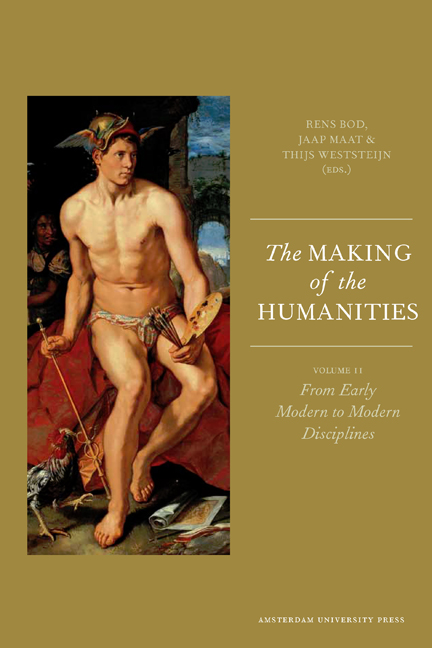Book contents
- Frontmatter
- Contents
- Introduction: The Dawn of the Modern Humanities
- I Linguistics and Philology
- II The Humanities and the Sciences
- III Writing History and Intellectual History
- IV The Impact of the East
- V Artworks and Texts
- VI Literature and Rhetoric
- VII Academic Communities
- Contributors
- List of Figures
- Index
Ancients, Moderns and the Gothic in Eighteenth-Century Historiography
Published online by Cambridge University Press: 19 January 2021
- Frontmatter
- Contents
- Introduction: The Dawn of the Modern Humanities
- I Linguistics and Philology
- II The Humanities and the Sciences
- III Writing History and Intellectual History
- IV The Impact of the East
- V Artworks and Texts
- VI Literature and Rhetoric
- VII Academic Communities
- Contributors
- List of Figures
- Index
Summary
In his Querelles littéraires (1761), the abbé Augustin-Simon Irailh puts forward a two-volume history of European poetics through the ordering and description of the main literary polemics from Homer to his day. The essay, bearing the secondary title of Mémoires pour servir à l’histoire des révolutions de la République des Lettres, is presented in the preface as a collection of ‘secret’ records of literary history, a humorous Théatre de la vérité in which cultural history appears dramatized through the most conspicuous moments of crisis and disturbance. Focusing on cultural change (the ‘revolutions’ of the Commonwealth of Letters), Irailh gives priority to the inner workings of intellectual history and thus considers literary quarrels as a genre especially suited to reveal the particular insights and motives of literary transformation: ‘Amongst all these disputes, held by one side and the other with so much heat, through this chaos of insults and abuse, among these continual revolutions, the reader can follow the thread of our learning, the progress of taste, the march of the human spirit’.
Irailh understands the exercise of quarrelling over literary matters as the product of illness, violence and hate. He labels it as ‘cette espèce de maladie’ in which sometimes the merits of the discussion get lost amid the turbulence of personal insult. ‘Les passions aveuglent’, and the participants in a quarrel do not always act in good faith (Irailh compares them to beasts fighting in a circus). However, despite or because of their brutal nature, these particular literary revolutions appear to be a thorough manner to get to the bottom of things, if not to fully uncover the truth. Spurred on by this conviction, and also by the amusing sight that this erudite show offers, Irailh selects those quarrels most worthy of attention, either for the interest of their subject matter or for the outrageous claims of their contestants. The commentary of the different quarrels serves Irailh to put together a historical narrative that advances teleologically (and often spuriously) from the quarrel between Homer and the forger Thestorides to the account of the disputes surrounding the Encyclopédie.
- Type
- Chapter
- Information
- The Making of the HumanitiesVolume II: From Early Modern to Modern Disciplines, pp. 321 - 336Publisher: Amsterdam University PressPrint publication year: 2012

